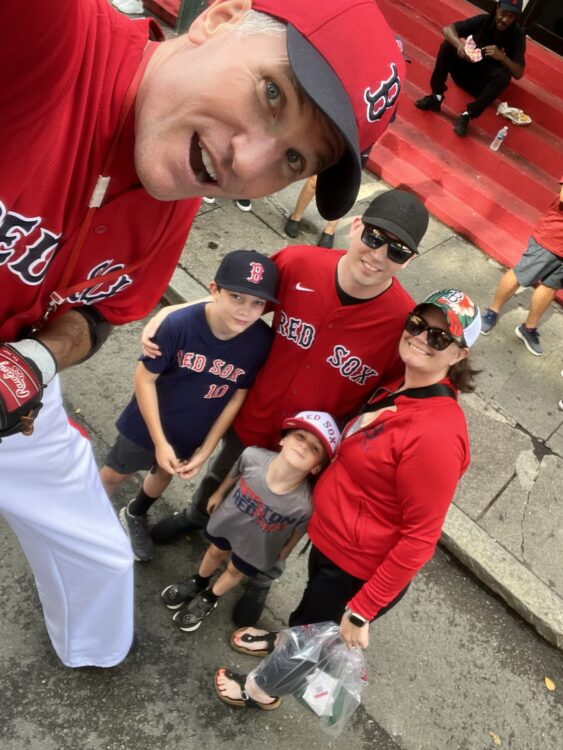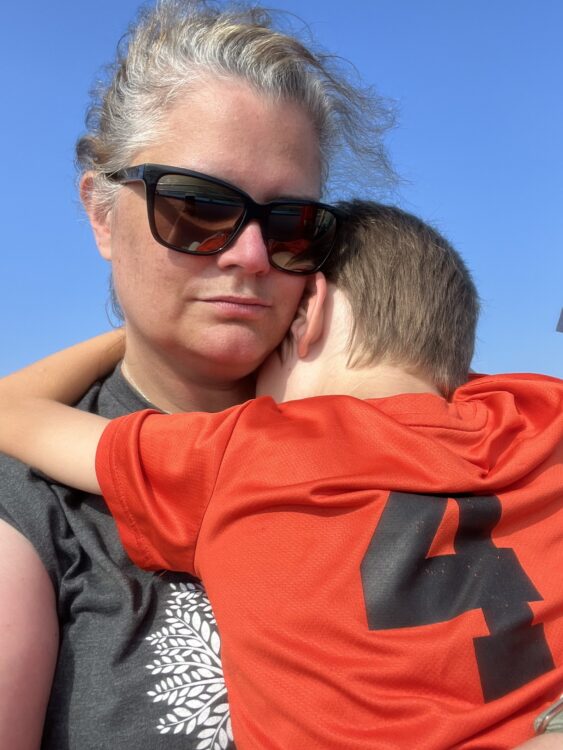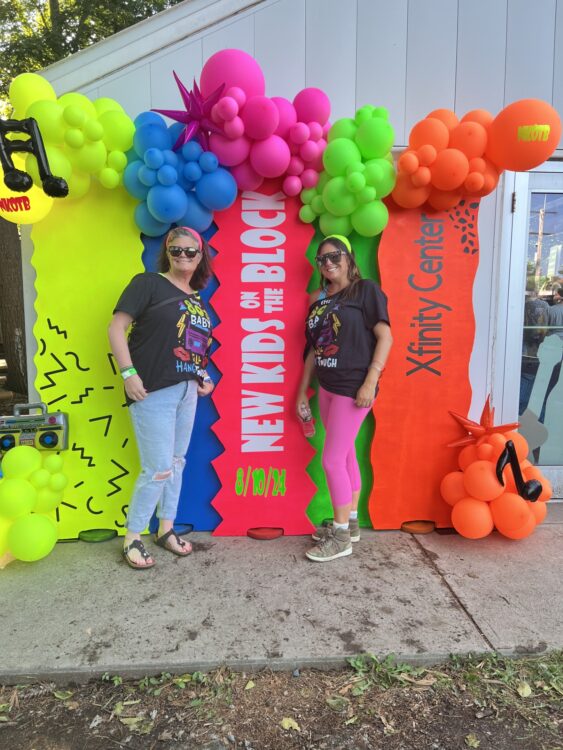Theresa W. resides north of Boston with her husband, Bryan, her 2 sons, Trent and Baelor, and their dog, Roxie. She works full-time as the director of health and human services in a local town. Theresa is a huge Red Sox fan — so much so that she was married on a 1st-base plate from Fenway Park – and New Kids on the Block fan! In her spare time, she enjoys watching her kids play sports, hanging out with her family, knitting, and reading.
My diagnosis
In September 2022, I developed a severe headache. No matter what I tried, I couldn’t kick it, which isn’t normal for me. I went to my neurologist, who gave me some new medications to try, but they didn’t help. It got to the point where I was taking Excedrin every 6 hours just to function.
In retrospect, I realize there were other symptoms, too. I had a cough that summer that lasted a couple of weeks, but I wrote it off to allergies. I had also lost 40 pounds in a matter of months without trying, and I had shortness of breath when walking up the stairs, but I attributed that to having a broken foot.
That October, I had an MRI of my brain. It showed some spots, but my doctor said he wasn’t worried about them because I was only 41 years old. He advised me to come back in 6 months to a year to monitor them. A coworker urged me to get a 2nd opinion in case they were something serious. I met with a new doctor in January 2023 and had another MRI, this time with contrast. My doctor called me the next day to tell me that I had cancer in my brain. At that point they weren’t sure where it had originated.
I had a CT scan after that. I got a call from the doctor less than 30 minutes after leaving the hospital informing me that I had lung cancer. I was completely shocked. I have never smoked. My parents didn’t smoke. There wasn’t a history of lung cancer in my family. It seemed impossible.
Treatment
Right after my CT scan, I met with a pulmonologist and had a biopsy. About a week or so later the results came back showing that I had EGFR+ lung cancer. At the time, I had no clue what that meant, but my oncologist explained that this was one of the “good kinds” of lung cancer that is treatable through a targeted therapy. I started taking Tagrisso (osimertinib) later that month, and I’m lucky to still be on it to this day, almost 2 years later.
Tagrisso made me immediately break out in a rash, something I still struggle with. I also suffer from extreme exhaustion and brain fog. When I 1st started taking Tagrisso, I would sometimes find myself somewhere, and I couldn’t remember how I’d gotten there. It was quite scary. It’s something I’ve learned to control a little better with time, but I still struggle with fatigue.
This exhaustion has affected my life more than anything else. I can’t coach t-ball and baseball for my kids anymore, and I can’t take long walks like I used to because I get too tired. These are not necessarily big things, but they remind me that my life has changed.
My support system
I am lucky to have so many people in my life who want to help me and my family. My sister and my mom help out all the time. In fact, my sister comes every weekend to take my kids out, and either she or my mom comes with me to most of my doctor appointments.  I know how lucky I am to have them so close by.
I know how lucky I am to have them so close by.
My husband has also been phenomenal, but he is taking my diagnosis hard. Being a caregiver is challenging, but even worse than those demands is the feeling of being helpless to change my situation.
We have also tried to keep things as normal as possible for our boys. We waited a few weeks after my treatment started to tell them I was sick because we wanted to know how I would respond to the medications. We kept the conversation very casual. We told them that Mommy had had headaches for the past several months, and that when I went to the doctor, they found cancer. We told them that they put me on medication that makes me tired, but it’s hopefully going to get rid of the cancer.
My oldest had just turned 8, and my youngest was 5 at the time. Neither one of them cried when we told them, and they didn’t ask too many questions, but as time has gone on, we can see how much it has affected them. Our youngest shows more emotion about it overall and is really focused on the death and dying part of my diagnosis. This breaks my heart sometimes. My oldest doesn’t want to talk about it much, doesn’t want to know when my scans are, things like that. He’d prefer to pretend I’m not sick, which I understand too.
The financial impact
One of the things that people don’t talk much about is the financial aspect of receiving a lung cancer diagnosis. I have good health insurance, but there’s still a big financial impact that people don’t understand. Even with great insurance, we paid about $20,000 last year for my medical bills. My husband and I both have good jobs, but we still had to find the money somewhere. This means we’ve had to look at things like whether my son can play on a travel baseball team anymore or whether we can take a vacation. We have also had to ask family for help when things didn’t add up, which can be a humbling thing to do. Nobody prepares you for the financial part of cancer.
My work has also been affected. I have had to frequently miss work for doctor appointments or sickness. Last December, I was so sick that I worked 8 total hours all month. It ate up my sick time and into my vacation days and personal days. I’m lucky my employer is so understanding, but I know everyone isn’t as lucky. It also adds to your stress – wondering how long they might hold your job or, if you were to lose your job, whether someone would ever employ you again knowing your health history.
A new normal
I am faced with a new reality now: I don’t know how much time I have left. My dad died when he was just 49, and I work with seniors, so knowing that death can happen at any point isn’t new to me. However, before my diagnosis, I never thought much about the possibility that I might not live to be in my 80s or 90s.  Now, I’m more aware that none of us know how much time we have left, and I try to let that awareness make me more present in the moment and more grateful for what I do have.
Now, I’m more aware that none of us know how much time we have left, and I try to let that awareness make me more present in the moment and more grateful for what I do have.
When I was 1st diagnosed, I made the mistake of asking my doctor for my long-term prognosis. He said, “5 years is average.” That’s not a long time. That’s 60 months. It’s 5 birthdays, 5 more Christmases. It’s not a lot. It’s not nearly enough time. The difference is that compared to before my diagnosis, I don’t take a single one of those celebrations for granted now.
I also really try to tell people what I’m feeling when I feel it. If I were to die tomorrow, my Facebook page would be filled with condolences. That’s great, but tell me now while I’m here! I don’t save how I’m feeling about people for another day. If I love someone, or if I’m thankful for them, I tell them now. You never know if you might not have the chance again.
Advice for others with lung cancer
The best advice that was given to me was, “don’t Google anything.” If you Google “stage 4 lung cancer,” it’s going to tell you that it’s an immediate death sentence, but that’s not the case anymore. You can still live a normal life. I’m still working. I still take care of my kids. Is it harder? Yes. But it’s possible, and Google won’t tell you that.
I would also tell people that a lung cancer diagnosis is nothing to be ashamed of. When I was 1st diagnosed, I really didn’t understand how this had happened to me, especially as someone who had never smoked. I looked for ways I could blame myself for the disease and I was embarrassed to tell people about it because I thought they might blame me too. But it’s not my fault. It’s not anybody’s fault. It’s just the way the cookie crumbled for me.

I’m inspired by your story, Theresa. For the skin rashes, try calendula cream, brand name Boiron. It’s available on Amazon. It seems to work systemically so apply it to your whole body, twice a day to start. My naturopath suggested I try it and I thought she was nuts. But now I don’t experience Tagrisso-related rashes any longer.
Do you do radiation and chemo as well ?